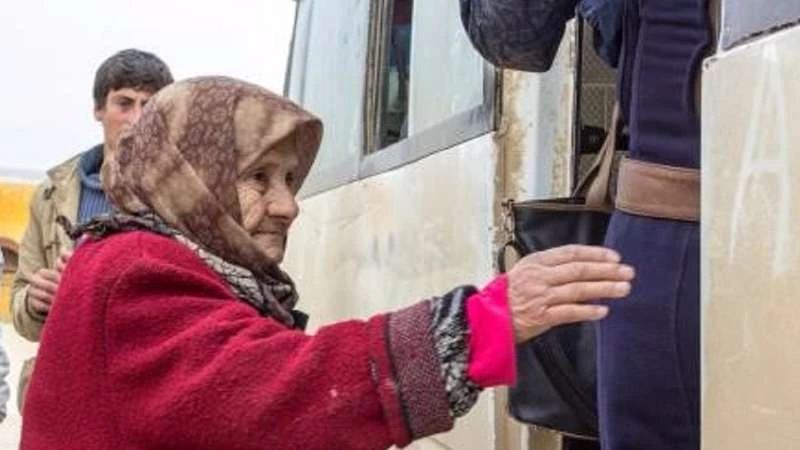Embarking on a trek that can take up to twenty hours can be physically as well as psychologically exhausting at any age, let alone having to deal with the lack of all kinds of services on the way in addition to the potential dangers involved in traveling during wartime.
In spite of the risks involved, elderly Syrians are finding themselves forced to travel with the most notable reason driving them to it being a lack of health services in the towns and villages where they live.
They may be forced to travel long distances by the need for a specific medical procedure not available after the war destroyed health facilities in their area or medical practices were abandoned by doctors for a number of reasons.
Thus they struggle with the fatigue of traveling to the big cities where they are more likely to be able to find a hospital or a doctor with a certain medical specialty.
Rest stations that used to provide welcome breaks from the fatigue of traveling that were once located along the roads at regular intervals are no longer there to meet the needs of weary travelers.
Also, in the event that a medical emergency arises along the way, the inconsistency of cellular service makes it difficult to connect with any medical center or even call an ambulance in case of an emergency.
Haiven, who recently had to travel from the town of Termanin in northern Idlib to east Aleppo, told Orient Net: “I came to Aleppo two days ago with my sister Kifah who needed to have X-Rays and lab work done.
“The drivers who brought us were forced to take much longer routes due to the closure of those roads that used to connect directly between the cities because of the outbreak of military action or bombing,” Haiven added.
The distance between Aleppo and Idlib that used to take no more than an hour and a half to cover today ranges between 11 and 15 hours with a good percentage of the additional time related to the duration of stops made at the checkpoints.
Abo Hassoun, who has also traveled between Aleppo and Idlib, told Orient Net that they passed through "more than 20 barriers during the trip.”
“Assad regime forces don’t care if someone is a patient, an elderly person or a child, or even if you tell them that there is an old man dying in the car.
“Sometimes, we wait three or four hours before reaching our turn in the queue. We used to travel at night when the traffic is less,” added Abo Hassoun.
Furthermore, Aleppo University Hospital receives lots of elderly patients arriving with health problems caused by traveling long distances.
Dr. Ghazwan, who is an Orthopedic Emergency Room physician, says: “In the emergency department, we investigated many elderly patients who had heart disease aggravated by traveling.
Some came in with dangerously high blood pressure or were experiencing acute renal failure while some had even suffered a heart attack.
On the other hand, in the past it was almost always the young visiting their elderly family members.
In today’s Syria, the roles have been reversed and it’s the elderly traveling to visit their families, or going to the city centers to obtain official documents, due to the relevant ease of passing through checkpoints experienced by the older generation as opposed to the young one.



التعليقات (0)